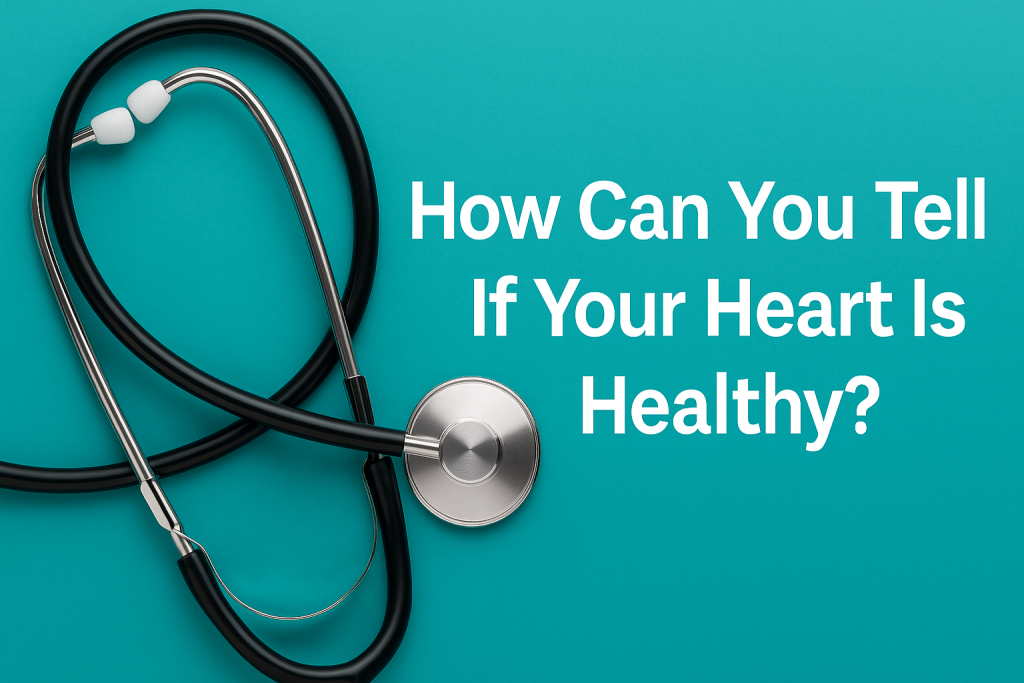Maintaining a healthy heart is crucial for overall well-being and longevity. Cardiovascular diseases remain the leading cause of death globally, but the good news is that many heart problems are preventable with the right lifestyle choices and awareness. But how can you tell if your heart is healthy? In this comprehensive guide, we’ll explore the signs of a healthy heart, self-check methods, risk factors to watch for, and steps to keep your heart in top shape.
Why is Heart Health Important?
The heart is the powerhouse of your body, circulating blood, oxygen, and nutrients to every cell. When your heart is healthy, it ensures efficient blood flow, nourishment, and waste removal for all vital organs. A healthy heart reduces your risk of heart attacks, stroke, high blood pressure, and other chronic conditions that can significantly affect your quality of life.
7 Signs That Indicate Your Heart is Healthy
Wondering if your heart is functioning well? Here are seven positive signs to look for:
- Stable Blood Pressure: Healthy adults typically have a blood pressure reading of around 120/80 mmHg. Consistently normal blood pressure indicates your arteries are flexible and your heart isn’t working overtime.
- Normal Heart Rate: A resting heart rate between 60-100 beats per minute is considered normal. Athletes or highly active individuals may have a lower resting heart rate, which can be a sign of good cardiovascular fitness.
- Cholesterol in Healthy Range: Healthy cholesterol levels (total cholesterol under 200 mg/dL, LDL under 100 mg/dL, and HDL above 40 mg/dL for men, 50 mg/dL for women) are important for preventing plaque build-up in arteries.
- Absence of Chest Pain or Discomfort: Regular, unprovoked chest pain or discomfort can be a warning sign of heart problems. A healthy heart typically does not produce these symptoms.
- Good Physical Endurance: If you can walk up stairs, exercise, or engage in physical activity without excessive fatigue or shortness of breath, it’s likely your heart is in good condition.
- No Swelling in Extremities: Swelling in the legs, ankles, or feet (edema) can be a sign of heart failure. Healthy hearts generally don’t cause this symptom.
- Normal Energy Levels: Persistent fatigue can signal that your heart isn’t pumping efficiently. Feeling energized throughout the day is often a sign your heart is working well.
How to Check If Your Heart is Healthy
While some signs of heart health are visible and perceptible, others require medical testing or monitoring. Here are some methods to assess your heart health at home and with your healthcare provider:
1. Monitor Your Pulse and Heart Rate Variability
Check your pulse at your wrist or neck. A regular, steady rhythm and rate within the normal range indicate a healthy heart. Heart rate variability (HRV) is another indicator—higher HRV often points to better cardiovascular fitness and stress resilience.
2. Track Your Blood Pressure
Use a digital blood pressure monitor to check your levels regularly. Healthy blood pressure is essential for preventing strain on your heart and arteries.
3. Pay Attention to Symptoms
- Shortness of breath: Occasional shortness of breath during intense exercise is normal, but regular breathlessness at rest or during mild activity could signal a problem.
- Palpitations: While occasional skipped beats can be harmless, persistent palpitations should be checked by a doctor.
- Dizziness or fainting: These could indicate poor blood flow or heart rhythm issues.
4. Get Regular Blood Tests
Your doctor can order tests to check cholesterol, triglycerides, blood sugar, and inflammatory markers. Elevated levels can increase your risk of heart disease.
5. Undergo an Electrocardiogram (ECG)
An ECG records your heart’s electrical activity and can detect irregularities, such as arrhythmias, that may not produce noticeable symptoms.
6. Echocardiogram and Stress Test
An echocardiogram uses ultrasound to create images of your heart, showing how well it pumps blood. A stress test, often done on a treadmill, evaluates your heart’s performance under exertion.
Risk Factors to Watch For
Even if you feel well, certain risk factors can silently damage your heart over time. Be aware of the following:
- High blood pressure
- High cholesterol
- Smoking
- Obesity or being overweight
- Diabetes
- Family history of heart disease
- Physical inactivity
- Poor diet high in saturated fats, salt, and sugar
- Chronic stress
If you have any of these risk factors, it’s even more important to monitor your heart health and adopt preventive measures.
Tips for Keeping Your Heart Healthy
Whether your heart is healthy or you’re hoping to improve your cardiovascular health, these strategies are proven to help:
- Eat a Heart-Healthy Diet: Focus on fruits, vegetables, whole grains, lean proteins, nuts, and healthy fats like olive oil. Limit processed foods and salt.
- Exercise Regularly: Aim for at least 150 minutes of moderate aerobic activity per week, such as brisk walking, cycling, or swimming.
- Maintain a Healthy Weight: Achieving and maintaining a healthy weight reduces the strain on your heart and lowers your risk for several cardiovascular diseases.
- Don’t Smoke: Quitting smoking is one of the most important steps for heart health.
- Manage Stress: Chronic stress can harm your heart. Practice relaxation techniques such as yoga, meditation, or deep breathing exercises.
- Control Blood Pressure and Cholesterol: Regularly monitor and manage these with diet, exercise, or medication if prescribed.
- Get Enough Sleep: Aim for 7-8 hours of quality sleep each night, as poor sleep can increase your risk of heart problems.
- Limit Alcohol Consumption: Excessive drinking raises blood pressure and adds extra calories.
When to See a Doctor
If you notice persistent symptoms such as chest pain, shortness of breath, fainting, irregular heartbeat, or swelling in your legs, consult a healthcare provider as soon as possible. Early detection and intervention are key to preventing serious heart conditions.
Conclusion
Understanding how to tell if your heart is healthy empowers you to take charge of your cardiovascular wellness. Regular self-assessment, symptom awareness, medical checkups, and a heart-healthy lifestyle can help ensure that your heart continues to serve you well for years to come. Remember, prevention and early action are the cornerstones of lasting heart health.


